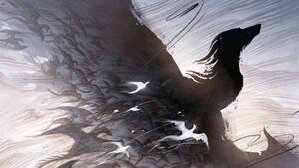Nino Cipri’s short story collection, Homesick, centers on characters aching for family of the biological or self-assembled variety, either of which has been disbanded by rejection, loss, time, or death. Death is pervasive, and every story haunted by the dead or the dying. There are many ghosts and closets in the collection, and even a ghost in a closet, like in the collectoin’s first story, “A Silly Love Story,” about a failed art student, Jeremy, in love with his bigender friend named Merion. Jeremy has a ghost in his closet, a poltergeist that smells like apricots and unravels his suits. The ghost needs to get out of Jeremy’s closet before everything in the closet is turned just as inside out and unraveled as his life.
Nino Cipri; photo credit: Korbin Jones
All the characters in Cipri’s collection have ghosts to contend with, whether literal wraiths (“Presque Vu,”) or psychological torments (“She Hides Sometimes”). There’s a wildness to what haunts the characters, like the throat-clogging feathers and mud of “Dead Air” that torment a young woman, Maddie, following a car accident in her teens. After Maddie’s car plunges over a drop off into the woods, her companion, Emily, goes missing, as does any mention of the wreck in news archives. In fact, the whole town where the accident occurred seems to be missing from the maps, swallowed by the woods and the wildness that refuses to relinquish Maddie to the world of dive bars and girlfriends and hourly jobs.
Names are lost often, in Homesick, like when a young trans boy has to travel across time to convince his mother that the name she gave him at birth was not his real name and still, she refuses to listen. Names are fluid, unlike words, which are binding to characters like “A Silly Love Story’s” Jeremy, who prefers images for their ability to give the world nuance and interpretation. Merion moves seamlessly between male and female just as the young man in “The Shape of My Name” moves through time to find the home where he’ll be accepted as he is. Time is fluid. The line between civilization and nature is fluid, as is the line between the living and the dead, the “clumsy, hungry birds” of the wraiths in “Presque Vu.”
They had torn into a wraith in broad daylight, so why did it matter? He had only watched. Jesus, he had watched.
In “Presque Vu,” wraiths exist in the world like second class citizens, ignored unless they’re being beaten out of fear. They are silent, but civilized, tipping better than their human counterparts. The wraiths in the story can be stand-ins for any group that has been ostracized at best and outright attacked at worst.
In “Presque Vu,” everyone is haunted because everyone is “culpable.” As witnesses to injustice. As tormentors of others or themselves. As willing players in a rigged game. Who is the monster and who is not becomes as fluid as the ocean existing behind a couch in “Not an Ocean, but the Sea.”
Families committed to rigidity, like that in “She Hides Sometimes,” find that there is no safety in “facts, truths that were clipped and groomed into manageable, sensible creatures.” When Anjana’s mother loses her lucidity to dementia, the sickness is “feral and strange. It had no name and no diagnosis, just a list of symptoms that added up to a woman Anjana no longer knew.” Her mother becomes invisible, the family talking around her but not to her. As her mother’s mind diminishes, so does Anjana’s childhood home, the whole construction shrinking and contracting around her until there’s nothing left except the closet she hid in as a child. The closet, we can assume, she’s still yet to come out of. Anjana is as much a stranger to her family as her mother is to the family, now.
The homesickness of the book’s title may refer to the desired acceptance from those we love – whether biological family or lovers or friends – or it may refer to the homesickness for our authentic selves, our wild selves. Who we are when we can unfold our legs from the constraints of our arms, crack our spines so they straighten, and let the mud pour out of our mouths and back into the earth where it belongs, freeing our voices, finally.












Cadwell Turnbull's new novel — the first in a trilogy — imagines the hard, uncertain work of a fantastical justice.